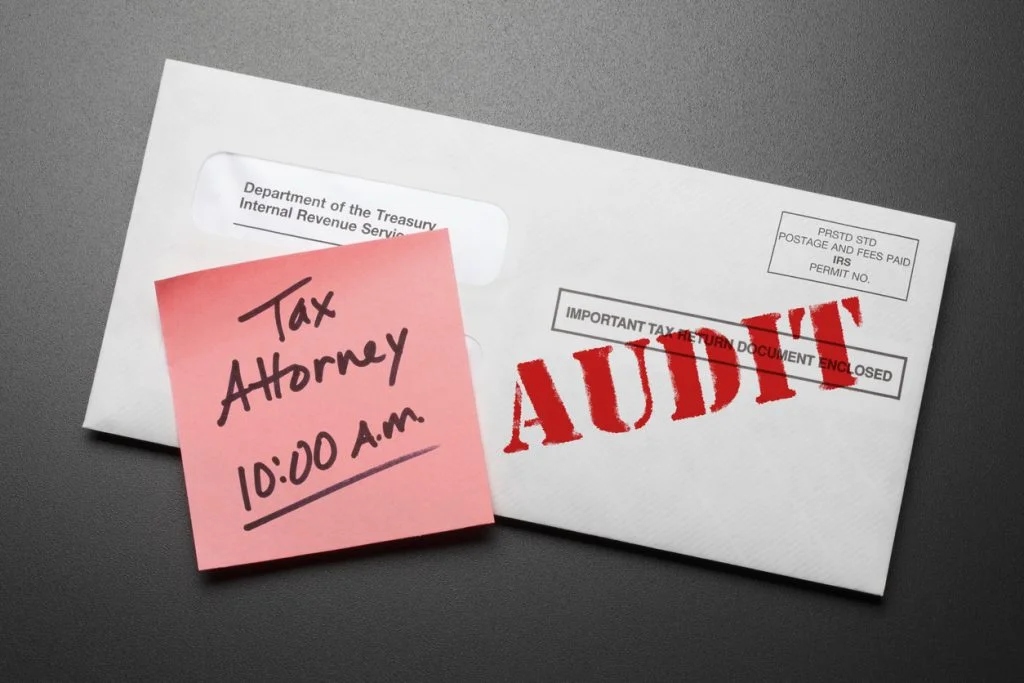The thing that strikes fear in the hearts of entrepreneurs across the US, especially this time of year, is the specter of an IRS audit hanging about like the Ghost of Christmas Yet To Come. There is such widespread fear and loathing of such a thing that many business owners are hesitant to take even commonly deductions.
For what it’s worth, that’s a bad idea — NOT taking advantage of all your allowances is also likely to trigger some eagle-eyed IRS audit agent’s attention–what are you trying to hide? On the flip side, taking too many deductions can have the same effect–it’s a high-wire act to claim all of your deductions while staying under the audit radar.

In reality, the IRS doesn’t even audit 1% of the millions of returns they get every year, and they typically target super high-income taxpayers–an error on three million dollars in income yields a better return than an error from the guy earning $75,000. Like any government agency, the IRS really does have limited resources (reams of rules and regulations does not translate to equitable manpower), so more than likely they’re going after the low-hanging fruit.
The IRS has an algorithm called Discriminant Information Function (DIF) that scans every return that comes through the system. DIF is on the lookout for things like duplicate data–a divorced couple each claimed the kids as dependents, for example–and anomalies when compared against similar taxpayers. A $10,000 charitable contribution with an income of $35,000 just doesn’t make sense, and there will be questions.
Reporting Incorrect Taxable Income
The IRS is like Goldilocks with respect to reporting your income–it’s got to be just right. As discussed, big incomes are an audit trigger. But so is 1040 that shows no income — unless you’re a student, whose AGI typically zeros out. In 2016, the IRS audited 3.5% of no income returns, as opposed to .7% for returns in the $50,000-$75,000 range.
Failure to Report Income
It comes as a bit of a surprise to fledgling entrepreneurs that the IRS gets a copy of everything they do. Every W2, 1099, K1–you name it.
If you have it, the IRS does, too. So when you submit your income figures, they already have that information filed away under your SSN or EIN.
You’re simply confirming those numbers and submitting your deductions to subtract from the default tax obligation they calculate based on your income and filing status. If you hit it big in Vegas or just at the gas station, you and the IRS will get Form W-2G for reporting.
Here’s a fun fact–in some states, if you fail to file after a certain number of years, the state’s Revenue Department will send you a tax bill based on that big round default number.
Business Deductions Should Scale
Schedule C is the sole proprietor’s best friend come tax time, but it’s imperative that your deductions make sense. When DIF runs your return through the system, it’s comparing you to other companies in your line of work–that’s what that Occupational Code box is for. DIF has calculated averages for your industry, and your deductions should fall in line within that range.
Schedule C
Any and all deductions you take should be precise and documented to avoid any undue government interest. The IRS and DIF review both high-grossing and small sole proprietorships, both for the same reasons–under-reporting income.
Businesses that gross over $100,000 in sales on Schedule C, cash-intensive businesses, and business owners who show a substantial loss are at a higher risk for audit.
If you operate at a loss for several years, the IRS may consider your business a hobby and disallow your deductions. There’s more on the rules that differentiate hobby from business further down.
Careful With The Cash
Cash-intensive businesses are usually service-oriented–salons, ride-share and taxis, car washes, handyman, bars and restaurants, and customers tip in cash. Here’s a tip from your friendly tax attorney–don’t pocket the cash. Keep a log and deposit it in the bank.
Suppose you have a nice handyman business and your customers pay you in cash from time to time. Your documented sales that you report to the IRS are $60,000 for the year.
Let’s assume that you made an equal amount in cash, and that cash puts you in the position to glam up your lifestyle a bit–say a nice European vacation or a new beach condo. The DIF will likely flag the mortgage on the condo and run some quick numbers that indicate you really can’t afford it based on your reported income, and you’ll trigger an audit.
Record Deposits
In today’s digital economy, it’s rare to have large sums of cash deposited, but it does happen. Document the source of the original transaction when you make the deposit, and if the amount is over $10,000 you’ll need to file IRS Form 8300.
This form is passed along to the Financial Crimes Enforcement Network (FinCEN). FinCEN combats crimes like money laundering that facilitate terrorism and the like, so if you have large deposits it is rather important that you let the IRS know where the cash is coming from.
For most taxpayers, hiding cash isn’t as attractive as it may seem. Not only are you running a higher risk of an audit, but you’re shortchanging yourself in the long run.
That unreported income could be the difference in qualifying for a mortgage or a business loan in the future, so think strategically before you hide the money in the mattress–there are better tax abatement tactics.
Mileage
If you’re a large animal veterinarian and use Form 4562 to write off 20% of your mileage, that should be in line with DIF data on other vets who have to make house calls.
Also, don’t try to tell the IRS that you only use your professional vehicle for business–if you tell them that you use it for business 100% of the time, this means you NEVER stopped by Walmart for a grocery run on the way home. Checking that box is red meat for the IRS.
If you get seduced into buying a heavy SUV or large truck during the dealer’s end of year sales, keep super-detailed records of business use. These trucks are eligible for more aggressive depreciation and write-offs, so be absolutely sure all your deductions will stand up to an audit.
Home Office Deductions
This one is really tricky. To qualify for the home office deduction, that space can only be used for business–no doubling on the weekends as the kid’s TV room.
Again, scale is key–the square footage of your office should be in proportion to the size of your house. IRS Publication 587 is a treasure trove of information for taking that deduction.
Meals, Travel, And Entertainment
As we mentioned before, your deductions for meals, travel, and entertainment must be in line with industry averages or DIF will flag the return. Actually, the TCJA eliminated “entertainment” expenses deductions, so if you take your clients to play golf or out to dinner, it’s out of your wallet.
Online banking makes record keeping absurdly easy, and there are apps to keep track of meal and travel expenses on the go. The IRS has cracked down hard on deducting these expenses, so you should note all the details of the event (who, where, how much, purpose of meeting, topics of discussion).
Keep the receipts if you spent more than $75. This also applies to lodging while you’re on the road for business–a trade show, for example.
Hobby Or Business?
One of the changes that the Tax Cut And Jobs Act (TCJA) brought about is the expectation that after a couple of years, your business will turn a profit. This rule is apparently a test drive as it is only applicable through 2025.
To claim your online jewelry making business as a business, you must show a profit for three of the past five tax years. The only exception is if you’re in the horse breeding business, and then you have to be in the black two out of seven years.
Otherwise, it’s a hobby and you’re out of luck. If this is the first year you’ve run your business, you can file Form 5213 and give yourself four more years to see a profit.
Filing this form ay trigger a second look by the IRS, so weigh your profit potential before you make that decision. If your tax advisor tells you you’re teetering on the edge of having an expensive hobby, make sure you have the records to document you spend a significant amount of time each day growing the business.
If you have other sources of income that clearly support your lifestyle and you consistently report business losses, you are waving a giant red flag at the IRS that your business is a hobby.
Rental Property Rules
Who Qualifies For Rental Property Deductions
If you’re in the real estate rental business, you need to be able to prove it. IRS agents have a bead on excessive rental real estate losses, especially if the taxpayers claim to be a real estate professional is suspect. Suspect means there is W2 income, as well as substantial Schedule C income from a non-real estate business–landlords with day jobs, are the targets here.
Active participants (you manage it yourself) can deduct up to $25,000 from other income. This allowance decreases as your AGI exceeds $100,000 and completely disappears once your AGI is $150,000.
Alternately, a real estate professional who spends. more than half their working hours and over 750 hours each year materially participating in the real estate business can write off rental losses. If you’re a realtor, developer, broker, or landlord you qualify under these rules.
Allowable Expenses
If you’re in the first year or two of having a rental property, you don’t have all the old rules to unlearn. Where your expenses are concerned, you either deduct in full or depreciate over time.
Getting this right is how you avoid a DIF trigger. There is some gray area here, so again, be sure to document all your expenditures.
Deductions
Repairs to your property are generally written off as deductions. Something that’s a one-time fix is considered a repair, no matter the actual cost.
Fixing a roof is a repair. For tax purposes, it’s a current expense, one that is necessary to keep the house habitable and so keep your business going.
You deduct the entire amount in the tax year you made the repair. If your bathroom repairs evolve into a $15,000 renovation, don’t try to deduct the cost–it becomes a capital expense, no matter what your original intent.
Depreciation
Capital improvements to the property fall under the depreciation category, and you have 27.5 years to fully amortize the expense. What’s an improvement rather than a repair? A new roof is an improvement as adds value and life expectancy to the property.
It’s Never the Math
It may surprise you to learn that the IRS really doesn’t care about errors in math. They’re concerned with errors in interpreting and implementing the tax rules.
The TCJA changes to writing off expenses and losses have complicated the tax calculation process, and you really should consult a tax attorney when you’re figuring out your business taxes. At Silver Tax Group, we are dedicated to not only working with you to devise the best tax strategies for your business but to help you fight the IRS if you’ve been audited.
Sole proprietors and other business owners are at a higher risk for audit because their tax situations are more complex than the average 1040 filer who has a straightforward W2 and just a couple of basic deductions.
You’re not only dealing with a number of 1099s, but you’re tasked with organizing a year’s worth of financial records and ensuring that all the numbers go on the right forms and in the right boxes.
Contact Silver Tax Group
Just the idea of an IRS audit is stressful, and if you think you’re going to be audited you’re going to make mistakes. We can alleviate that stress and we know tax law, so leave the worrying to us.
Contact us today!

Looking for Legal Assistance with your IRS Audit?
Get the help you need and speak with a Tax Attorney today!





